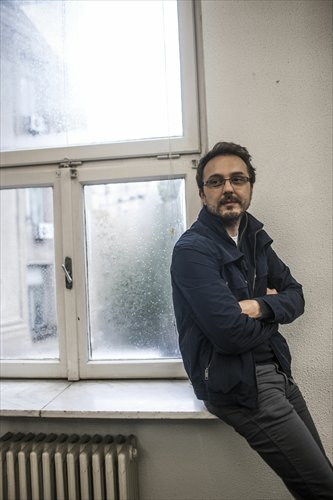Post-socialist scene

Calin Peter Netzer (above)'s latest effort, Child's Pose, has been submitted for Oscar contention. Photo: Li Hao/GT
Romanian films have become regular guests at big international film festivals in recent years.
The origin of what has been dubbed the Romanian New Wave is often traced back to 2001, when Romanian filmmaker Cristi Puiu's Stuff and Dough appeared in the Directors' Fortnight section of Cannes International Film Festival.
When Puiu's second feature, The Death of Lazarescu, won the Prix un certain regard at Cannes in 2005, he inspired a group of directors to pursue work that would meet the standard of A-list international film festivals.
Director and screenwriter Calin Peter Netzer could be counted among the inspired. The year 2013 has marked a particularly illustrious year for Netzer, as Child's Pose (2013), which won a Golden Bear earlier this year at the Berlin International Film Festival, has been announced as Romania's official submission to the Oscars.
Creating his own vision
Netzer was born in Romania in 1975. At the age of eight, he and his family moved to Germany.
The experience of living in a foreign country gave Netzer an early interest in films. Immersing himself in film was his way of coping with the new culture around him.
"I didn't integrate very well into Germany," he explained in a face-to-face interview with the Global Times.
As a teenager, he spent all his free time going to the cinema and creating his own vision for motion pictures. Gradually, he learned to tell his own stories and decided to work in film.
In 1994, Netzer went back to the Romanian capital of Bucharest to study filmmaking and graduated in 1999.
"I was quite young when I finished school … about 23, 24, and made my first film at 28," he said.
Netzer made some short film projects as a student and when a German producer saw his work in a festival, Netzer was asked to write a longer script. After a few drafts, the producer arranged a meeting with another screenwriter and the two worked on the script together for what would become Maria (2003), a co-production among Romania, Germany and France.
Maria went on to be a success for Netzer, earning nominations at festivals from Bratislava to Chicago and also winning awards such as the Special Jury Prize at the Locarno International Film Festival in Switzerland.
His second feature, Medal of Honor (2009), also garnered recognition in several European film festivals including the Thessaloniki International Film Festival in Greece.
When asked about the significance of these prizes, Netzer said his emotions are complicated.
"It is the only way to be noticed," he said.
Leaving Romania to 'be noticed'
Netzer's interests, like those of many of his Romanian contemporaries, lie in dramas and the art house style. Similarities across the Romanian New Wave include favoring hand-held cameras and long, sustained shots, which both add to a realistic style. The stories themselves tend to be distinctly Romanian - reflections on a socialist past and the continued emotional and social struggles.
"We are a depressed generation," the very shy Netzer joked.
"[In] every interview they asked me about what is the secret of the New Wave. I have no answer ... [They're] small films with small budgets. We want to make films about things we know and talk about," Netzer said.
He added that there were many factors inhibiting the development of a film industry in Romania. These included poor film distribution and education, plus the local audience simply is not in the habit of going to see Romanian films.
"Art films can go to the festivals. If you are successful there, it's easier to get [recognized at] home," he explained.
As in the case of Netzer's latest, Child's Pose, which portrays a mother of a wealthy family who tries everything to protect her son who is involved in a car accident, the project operated on a relatively limited budget of 800,000 euros (about $1 million).
Started in 2009, it took three years for Child's Pose to go from idea to completed film, most of which was spent waiting for financing.
"It is the most difficult thing in a way," he said. "For half year, you have the idea [of the script] and the other nine months to get money and the other two years to wait for the money to complete the budget."
In this instance, the waiting paid off as Child's Pose resonated not only with film festival juries but also with Romanian audiences, selling 160,000 tickets in local cinema houses, the highest box-office number for Romanian cinema in 10 years.
Not that foreign to China
Though some critics see corruption and the gap between different classes as the key themes of the film, Netzer said it was not his intention to make a film about a situation specific to only Romania.
"The first thing was about drama and relationships, mother and son," Netzer said.
Child's Pose can be easily relatable to audiences in other countries, especially China.
The family, with a strong mother and an over-protected son, bears some resemblance to the family culture present in China.
Chinese audiences also have some shared cultural experiences with Romanians, according to Yin Xiang, a film critic specializing in East European cinema. With Romania's socialist past and current move toward capitalism, Chinese audiences can relate.
Plus Romanian films have a history of being popular in China.
"[For] the younger generation in China during the 1960s and 1970s, their commercial films [were] Romanian films in that period," Mihai Kogalniceanu, general manager of the Romanian National Center for Cinematography, a public organization that is responsible for film rating and financing among other duties, told the Global Times.
Interestingly enough, the jury president of the 2013 Berlin Festival was Hong Kong director Wong Kar-wai, who openly expressed his favor for Child's Pose.
All these coincidences, along with a shared social and historical background, have made discussion of Romanian New Wave films a compelling topic here.